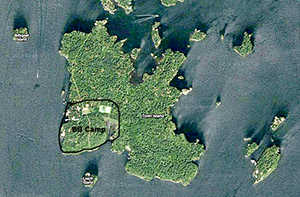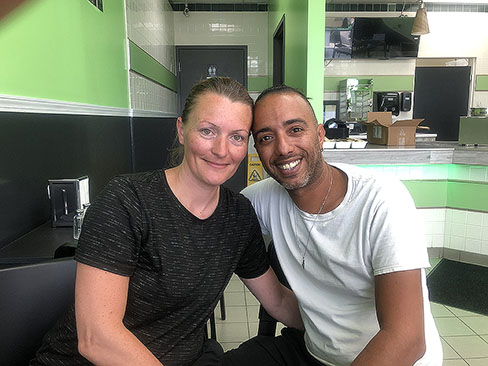Local News
Situation re possible sale of Town Island gets even murkier
 By BERNIE BELLAN
By BERNIE BELLAN
The situation regarding the possible sale of Town Island took a somewhat confusing twist these past two weeks when an online publication known as Kenora Online reported on Monday, January 13, that Kenora-Rainy River MPP Greg Rickford (who is also Ontario’s Northern Development Minister) said “he’s working with the City of Kenora on a possible Town Island land swap.”
However, a careful reading of what Rickford is actually quoted as having said might be interpreted as the exact opposite of what the Kenora Online wrote when it said Rickford is working on a “land swap” with Kenora. Here is what the article actually said:
“Kenora Rainy-River MPP and Northern Development Minister Greg Rickford says he’s working alongside staff with the City of Kenora to create an opportunity for more housing and land developments, and the plans include Kenora’s Town Island.”
“ ‘There’s discussions with the city and the Ministry of Natural Resources and Forestry on the opportunity. Now that we more clearly understand the city’s intentions are with it, I’ve assured the Mayor and Councillors (sic.) that we’re going to move forward and try to create an opportunity for them,’ said the minister.”
When I emailed Adam Smith, the City of Kenora’s Manager of Land Services, to ask him whether he could confirm that there have been negotiations with the Province of Ontario over Town Island, Smith categorically denied that there have been any negotiations with the Province of Ontario over anything to do with a land swap for Town Island.
Here’s what Smith wrote to me on January 17:
“Hi Bernie,
“The City has not had any discussions around a land swap with the Province (emphasis ours). I understand there is an article suggesting otherwise and I would suggest following up with the editor on the content.”
As a result of the possible misinterpretation of what Minister Rickford said to the reporter for Kenora Online, we have attempted to contact Minister Rickford himself to seek a clarification of what it is exactly that the Province of Ontario would like to do re Town Island.
In an email I sent to Minister Richford on January 17, I asked the minister the following:
“A careful reading of what you had to say could lead one to think that the province is interested in helping to ‘develop’ Town Island – which is the opposite of what those hoping for a land swap would want (which would be to see Town Island conserved in its natural state).
“Can you help me to understand just what it is that the province is interested in doing? Also, have there been negotiations with Kenora, but they don’t have anything to do with a land swap?”
In a previous article we noted that the City of Kenora had set January 31, 2020 as the deadline for receiving expressions of interest re Town Island. The clock is ticking. As we noted in our Short takes column of January 8, the Province of Ontario holds the key cards in this situation if it were to propose a land swap with Kenora for Town Island.
But, it is entirely possible that Kenora will want to move ahead with the sale of that part of Town Island which it still owns regardless of the position that the Province of Ontario might take. Thus, it is crucial to understand what Minister Rickford meant when he said that “There’s discussions with the city and the Ministry of Natural Resources and Forestry on the opportunity”.
What opportunity is he referring to? Is it the opportunity to “develop” Town Island, which is what he seems to be saying – and which would be devastating news for the Friends of Town Island and other groups that have rallied in support of halting the sale of Town Island or is it the opportunity to conserve Town Island as a “nature conservancy”, which is what the Friends of Town Island are proposing?
Certainly, ambiguity is what most politicians are very good at delivering when they offer any comments at all – if you can even get a politician to make a public comment. But, in the case of Minister Rickford, it doesn’t seem that he was being deliberately ambiguous. He certainly had something in mind when he said “he’s working alongside staff with the City of Kenora to create an opportunity for more housing and land developments, and the plans include Kenora’s Town Island.”
The problem here is that the reporter for Kenora Online didn’t follow up that remark with this sort of question: “Are you talking about developing Town Island?”
Instead, the reporter – and it would seem whoever was responsible for posting the story online, took Rickford to mean that he was interested in the idea of swapping Town Island, which explains why the headline for the story read: “Province, City working on Town Island land swap”.
Naturally, when I read that headline, my first reaction was: “Whew! Finally, the Province of Ontario is stepping in to help save Town Island from development”, which is something I suggested in our January 8 issue was the desired outcome for this vexing situation.
Thus, when I sent an email to Adam Smith of the City of Kenora, asking him whether he could confirm that there had been discussions with the Ontario provincial government about a land swap for Town Island, I was shocked to read that, not only was there nothing to announce regarding a deal to swap provincially owned land either in or adjacent to Kenora for Town Island – Smith denied there had even been any negotiations on the matter.
But, it took three days for Smith to respond to my query about a land swap. Once I received his response late Friday afternoon, I immediately contacted the reporter for Kenora Online to ask him whether he had recorded anything else Minister Rickford might have said that would have justified going forward with a headline that Ontario and Kenora were working on a land swap for Town Island?
Here’s what the reporter wrote back to me in an email: “That is the direct quote I received from Minister Rickford after speaking with him in person in regards to the Town Island land swap (emphasis ours). I’d encourage you to contact his office for more.”
So, it would seem clear that the reporter for Kenora Online was asking about a land swap when he spoke with Minister Rickford. And, I can well understand the reporter’s interpreting the minister’s response to mean that the Province of Ontario was indeed interested in a land swap, but this wouldn’t be the first time that a reporter might have rushed to judgement without asking a more specific question that would have removed any doubt as to what the minister meant.
Why all this concern about Town Island, you might be wondering? Well, if over 10,000 individuals have taken the time to sign a petition asking the City of Kenora not to sell Town Island, it’s pretty clear that this is an issue that resonates with a great many people.
And, with the clock ticking as we move ever closer to the possibility that Kenora may indeed sell off the rest of Town Island to a private developer (although there is nothing to forestall an organization or individual from coming forward with an offer that would see Town Island safeguarded from private development), it’s awfully important to remove any ambiguity as to what the Province of Ontario is prepared to do to protect Town Island – if anything at all.
I’m just afraid that the Kenora Online might have got it all wrong though – and, rather than wanting to preserve Town Island, the Minister of Northern Development for Ontario actually wants to develop Town Island. After all, his title contains the word “development”, not preservation.
And, given the response that I received from Adam Smith of Kenora in which he said there have not been any negotiations at all with the Province of Ontario over a land swap for Town Island, it doesn’t appear that the Province of Ontario will do anything to stop the sale of Town Island to private developers. Just the opposite seems the most logical interpretation of what Minister Rickford had to say: He wants to “develop” Town Island.
Post script: We have to attempted to reach Minister Rickford several times since this article first appeared in our print edition, including through his government office in Toronto and his constituency office in Rainy River – to clarify just what is the Government of Ontario’s intent with respect to Town Island, but have not heard back from anyone associated with the Ontario government.
This is one case though, where I hope I’m proved absolutely wrong though – and the Ontario government is sincerely interested in doing a deal with Kenora.
Local News
New Israeli restaurant opens in River Heights

By BERNIE BELLAN (July 6, 2025) It’s been a long time since our community has been able to welcome the opening of a restaurant that specializes in Israeli food.
That void is now going to be filled with the opening of The Green Falafel, at 1833 Grant (corner of Centennial – next to the Subway).

The restaurant is the fulfillment of a dream long held by the husband and wife team of Ariel and Eden Maudi, who have been living in Winnipeg the past 11 years.
Ariel, who was born in Israel and grew up in Beer Sheva, says that he worked in telecommunications in Ramat Gan for several years. He adds though that he had always dreamed of owning his own falafel stand in Israel, but life was difficult there and he decided to come to Canada as a tourist to see whether there were any opportunities here for him, Eden and their two young children.
Eden, who was born in Russia and moved to Israel with her family in 1996, stayed behind with the two kids, who were both pre-schoolers, while Ariel tested the waters in Canada first.
Ariel says he came to Canada as a tourist in 2013. His first stop was in Toronto, where he acquired his 1st class driver’s license. At the end of 2013 he moved to Winnipeg where he began working as a truck driver. Soon he found himself employed as a successful sales person at Vickar Nissan where, he says, he once achieved the status as the top car sales person in Canada. After working at Vickar Nissan for a number of years, Ariel began working as an installer for Bell MTS.
Meanwhile, Eden began working at a Walmart, later at the Costco on Regent.
But, when the opportunity to move into a space that had been previously occupied by another restaurant, but which had closed, became available, Ariel and Eden decided to open their own Israeli restaurant in an area that hadn’t seen Israeli food served since the controversial closure of Bermax Café in 2019.
The Maudis say that they will be serving a variety of Israeli dishes – all vegetarian, and that they will be fully kosher.
The “green” in Green Falafel, by the way, Ariel Maudi explains, comes from the cilantro and parsley that are added to the chickpeas. In addition, their pitas will be coming from Israel and will be baked fresh daily.
The Green Falafel will be open from 10-8 daily. Delivery will be available through Uber Eats and DoorDash.
Call 204-557-7837 for information.
Local News
Previews of shows with Jewish performers at this year’s Fringe Festival July 16-27

For show dates and venues go to winnipegfringe.com
By BERNIE BELLAN As has been our custom for many years now we try to find shows that have either Jewish performers or themes that would have particular appeal for Jewish audiences. Many of the Jewish performers at this year’s festival have been here before, but several are new. In no particular order here are blurbs about the shows we’ve found that fit the criteria I’ve just described. (By they way, if we’ve omitted a show that should be included in our list there’s plenty of time to get added to this post. Just drop me a line at jewishp@mymts.net.)

You’ve Been Served: A One-Woman Show About Divorce, Cults, and Coming of Age at Midlife
Noemi Zeigler
You are hereby summoned… to laugh, cry, and maybe belt out a Streisand number in solidarity. You’ve Been Served is a raw and riotous solo comedy by writer-performer Noemi Zeigler. It all begins when Noemi is served divorce papers on top of a garbage bin lid while taking out the trash—an undignified start to a full-blown midlife unraveling.
At 50, still clinging to her dream of becoming a singer, she falls under the spell of a music producer slash self-help guru, joins a spiritual cult, and, instead of landing a record deal, she lands in jail. Behind bars, with help from her long-buried inner child, she begins to reclaim her voice and her power. Turns out, dreams really do come true—just not the way she expected.
The show features vividly drawn characters—including a manipulative cult leader, a toxic ex-husband, and a jail guard named Roach who shares Noemi’s obsession with the fashion of Charlie’s Angels (the ‘70s TV version, of course.)
With salsa dancing, twerking, and a belting rendition of Don’t Rain on My Parade, Zeigler dives into abandonment, reinvention, and self-rescue. As she confronts perimenopause, she discovers it’s not the end—it’s the new puberty. The show touches on grief, sexuality, and spiritual confusion, but Noemi’s childlike optimism asks: What if your breakdown is actually your breakthrough?

You’re good for nothing… I’ll milk the cow myself
Written & Performed by Natacha Ruck
France, 1981: The first socialist president is about to be elected and young Natacha is ready to implement her own political platform. But first, she has to take down the schoolyard bully,emasculate the rules of French grammar and make off with grandmother’s chocolate.
If you think you know the limits of Jewish mothers, evil grandmothers and transcontinental lovers, meet Natacha Ruck’s family. This true tale of three generations of women, facing three world wars, is equal parts hilarious, shocking and zany.

A One Human Being, Potentially Comedic Performance of Beauty and the Beast NEW WORK!
Written & Performed by Alli Perlov
Be our guest! Local high school drama teacher Alli Perlov is back for a tale as old as time. Can she sing? Not really. Can she act? That’s debatable. Will you laugh? Oh… probably.
Perlov plays dozens of characters, some human, some animal, and many objects, in a comedic exploration of Beauty and the Beast.
In an homage to this brilliant musical adventure, through witty commentary and unstoppable energy, Perlov aims to entertain an audience that isn’t forced to be there like her students.

Hockey Sticks and Beaver Pie
Written & Performed by Melanie Gall
Take a trip around Manitoba. From the 30,000 ft. St. Adolphe snow maze to the Narcisse snake dens! After all, where else holds both the title of Slurpee Capital of the World and the Guinness Record for the most people simultaneously howling like wolves?
Deanna Durbin, Terry Jacks and Burton Cummings are among the many homegrown stars, and Hockey Sticks features their music along with original songs and the stories that make this province unique.
Starring Melanie Gall from past shows Piaf & Brel, Ingenue and Toast to Prohibition

Nerohilarity Exposed
Produced by Adam Schwartz
We all sometimes feel exposed, whether that’s as a fraud or a pretender.
The performers of the award-winning Neurohilarity show, Danielle Kayahara (Laugh Out Loud CBC), Carole Cunningham (Yuk Yuks, The Debaters), Adam Schwartz (Winnipeg Fringe) and Rollin Penner (Yuk Yuks, CBC, Rumors, Winnipeg Comedy Festival), apply a comedic spin to the experiences that make us feel insecure, stripping away the emotional weight with nittygritty jokes and stories that will have you laughing uproariously.
Brilliantly awkward.

A Lesbian in the Kitchen
Willow Rosenberg
Professional lesbian Willow Rosenberg takes you on a journey through the centuries, superstitions and tablespoons of her lifelong passion for baking in this spiritual successor to 2024’s Jenny Award-nominated A Lesbian in a Bear Store.
Whether you have a favourite spatula, bake once or twice a year, or live in constant fear of being told to “just fold it in”, this one-woman show about family, joy, tradition (but make it gay),
Judaism, comfort, home (but make it gayer*), love, chemistry and magic is for you!
*Who’re we kidding, it’s all gay!

Eleanor’s Story: An American Girl in Hitler’s Germany
Written & Performed by Ingrid Garner
(Ed. note: Although Ingrid Garner isn’t Jewish, we thought the theme of this show might have a special appeal for Jewish readers.)
Based on Eleanor Ramrath Garner’s best-selling memoir, this 16x internationally award-winning adaptation – performed by her granddaughter, Ingrid Garner – details Eleanor’s youth as an American caught in Second World War Berlin.
Punctuated with humour and accompanied by cinematic sound and video, Garner embodies her ancestors in this coming-of-age odyssey, delivering an account of war that is more relevant than ever.

Reviewing The Free Press 2
Benji Rothman
The Winnipeg Free Press has run amok, reviewing each and every Fringe show over the past two decades without consequence or recourse. Now, it’s their turn… again.
In this refurbished work that debuted at last year’s Winnipeg Fringe, Benji Rothman once again takes the Winnipeg Free Press to task. In this (mostly) new, (hopefully) hilarious 45-minute show, Rothman dives deep into their past and exposes their faulty journalism, imbalanced reporting and, of course, embarrassing typos.
Local News
Jewish performers at this year’s Winnipeg Folk Festival July 10-13

The Black Sea Station
Long ago, there were the klezmorim, itinerant musicians who roamed the back streets of Eastern Europe, playing at parties for meals and a few coins. The sound they honed then was a visceral exploration of life’s joy, and its loss; they could whip audiences into a frenzy of dancing, or bring them to tears with the mournful wail of a clarinet. Today, Winnipeg’s own The Black Sea Station is carrying on this tradition. Featuring Daniel Koulack (bass), Victor Schultz (violin) and Myron Schultz (clarinet) — cofounders of seminal local klezmer act Finjan — along with Moldovan accordion wizard Nikolai Prisacar and multi-instrumentalist Ben Mink, the quintet transports listeners to a time and place long past. Through a mix of original songs rooted in history, and traditional tunes spun up with modern zest, they whirl through the exuberant klezmer sounds of their Eastern European heritage, tending the old ways with deep love and respect.
The Black Sea Station will be performing Sunday, July 13, at 1:00 pm in Snowberry Field.

Romi Mayes
Romi Mayes has taken some hard knocks in her life, but she’s never faded away. For more than 25 years, Manitoba’s first lady of blues-rock has been a lynchpin of the Canadian roots scene. She earned that position the old-fashioned way, through her gritty, passionately emotive music. With her sizzling guitars and full-throated rasp, the Juno-nominated performer howls and purrs through razor-edged lyrics, rocking out wherever she can find a stage. She’s long been one of the hardest-working musicians on the circuit, keeping a busy slate of gigs and mentoring up-and-coming artists to get a foothold on the trails she blazed. Now, after a nine-year hiatus from the studio, Mayes has put her scintillating sound back on record with her long-awaited seventh album, Small Victories — a return that leaves no doubt, no matter the ups and downs, Mayes is here to stay.
Romi will be performing Friday, July 11, at 1:00 pm in Burr Oak.

Leonard Podolak (with Matt Gordon)
Ireland’s Matt Gordon is a fiddler and singer, whose fleet-footed clogging and thigh-slapping hambone has taken stages by storm since the 1980s. Leonard Podolak is a virtuosic master of the clawhammer banjo, who for decades has whipped up some of Manitoba’s wildest roots parties with his band, The Duhks. Put those talents together, and they can promise you this much: we’re all gonna have a real good time. Longtime friends and musical collaborators, Gordon and Podolak deliver an exhilarating trip through old-time Appalachian music. Their performances seamlessly blend intricate instrumental lines with heartfelt singing and dazzling dance. They’ve teamed up on a few records over the years, including 2020’s bigband extravaganza Power Wagon: Live At Shanley’s. But the best way to experience this duo’s toe-tapping, hand-clapping chemistry is to see it live.
Podolak and Gordon will be performing A concert with a side of clogging Sunday, July 13, at 3:00 pm in Folk School.
